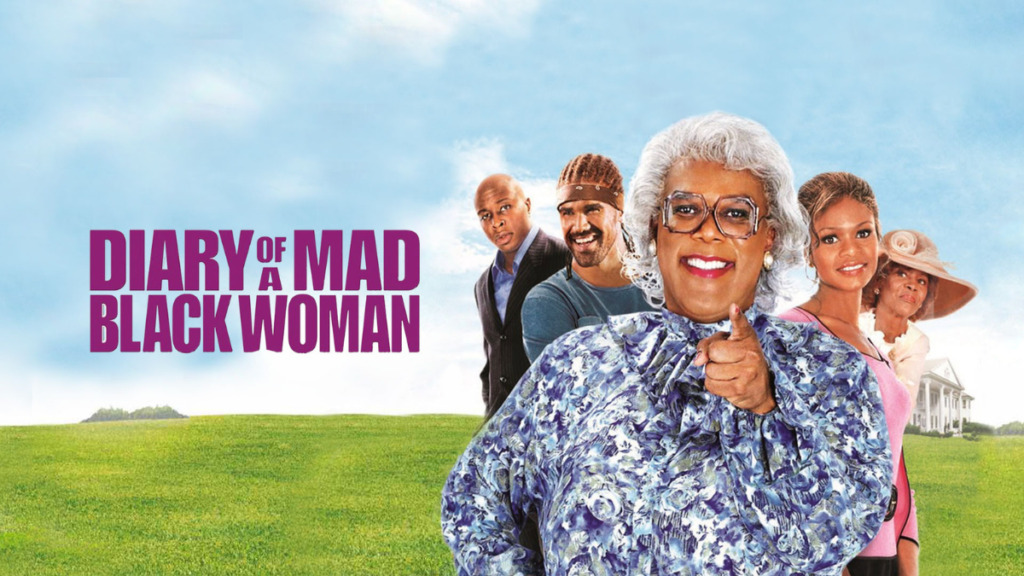“Diary of a Mad Black Woman” is a 2005 film that explores the complexities of love, betrayal, and self-discovery. Tyler Perry’s directorial debut, the film features Helen McCarter, a devoted wife who is shattered by her husband, Charles McCarter. The film highlights the essence of betrayal and the strength required to rebuild one’s life after such a breach of trust. Helen discovers her inner resilience and strength, seeking solace in her grandmother Madea’s home. The film also weaves a narrative of redemption, as Helen learns to forgive both her ex-husband and herself. The ensemble cast delivers stellar performances, making the characters relatable and memorable. “Diary of a Mad Black Woman” stands as a significant contribution to African American cinema, challenging conventional norms and proving that stories centered around Black characters can be both universally appealing and commercially successful. The film’s enduring themes, memorable characters, and impact on African American cinema make it a timeless classic that continues to resonate with audiences, inviting them to reflect on the strength found within one’s own life’s diary.
The Unraveling of Marriage:
The film opens with the seemingly perfect life of Helen McCarter, played by Kimberly Elise, a devoted wife living in luxury. However, the façade quickly crumbles when her husband, Charles McCarter (played by Steve Harris), blindsides her with a revelation that shatters their marriage. Charles not only discards Helen but also callously throws her out of their home. This stark betrayal sets the stage for Helen’s transformative journey from heartbreak to self-empowerment.
The Essence of Betrayal:
Helen’s painful divorce becomes the driving force of the narrative, and the portrayal of betrayal is vividly captured through her eyes. As she grapples with the aftermath of Charles’ betrayal, the audience is taken on an emotional rollercoaster, witnessing the raw and authentic portrayal of a woman scorned. The film invites viewers to reflect on the universal theme of betrayal and the strength required to rebuild one’s life after such a profound breach of trust.
Discovering Resilience and Strength:
Amidst the ruins of her marriage, Helen discovers her inner resilience and strength. Seeking solace in her grandmother Madea’s home, played by Tyler Perry himself, Helen begins her journey towards self-discovery. The character of Madea adds both humor and wisdom to the film, serving as a guide for Helen as she navigates the tumultuous waters of heartbreak and healing. The narrative unfolds as a testament to the strength found within oneself when faced with life’s most challenging moments.
A Tale of Redemption:
“Diary of a Mad Black Woman” weaves a narrative of redemption as Helen learns to forgive, not only her ex-husband but also herself. The introduction of Orlando, played by Shemar Moore, brings a new dimension to the story, offering Helen a chance at love and healing. The film beautifully illustrates how redemption can arise from the ashes of despair, emphasizing the transformative power of forgiveness and second chances.
The Multifaceted Characters:
The film’s strength lies in its rich and multifaceted characters, each contributing to the narrative’s depth. From Helen’s journey of self-discovery to Madea’s comedic yet profound wisdom, and the portrayal of the antagonist Charles, the characters in “Diary of a Mad Black Woman” are crafted with nuance and authenticity. The ensemble cast delivers stellar performances that breathe life into these characters, making them relatable and memorable.
Impact on African American Cinema:
“Diary of a Mad Black Woman” stands as a significant contribution to African American cinema. Tyler Perry’s storytelling not only resonated with a broad audience but also paved the way for more diverse narratives in the film industry. The film’s success challenged conventional norms, proving that stories centered around Black characters and experiences could be both universally appealing and commercially successful.
Conclusion:
As the credits roll on “Diary of a Mad Black Woman,” the audience is left with a profound sense of catharsis and inspiration. Tyler Perry’s directorial debut masterfully explores the complexities of love, betrayal, and self-discovery, leaving an indelible mark on the cinematic landscape. The film’s enduring themes, memorable characters, and impact on African American cinema make it a timeless classic that continues to resonate with audiences, inviting them to reflect on the strength found within the pages of one’s own life’s diary.







